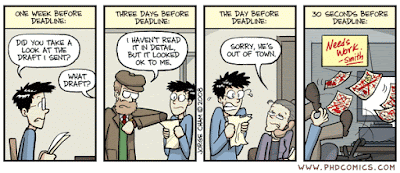Finishing a thesis (honours, masters, or PhD) can be exhausting: physically, emotionally, and intellectually. When you finally submit it, the last thing you want to do is look at it again or reflect on the experience. Unfortunately, many students do not have a break and soon they are caught up in a job search or starting a new job. Furthermore, it is easy for students to default to the academic track: Masters, PhD, postdoc1, postdoc2, ....
I have posted before about how the privileged few who get tenure may not make the most of transitions within an academic career. Here the focus is on students.
After a well-earned break, it is worth reflecting on the following questions, particularly before deciding what you might do next and how to make that a positive experience.
What are some things you enjoyed? did not enjoy?
What do you think you did well? not well?
What did you learn about yourself, particularly your strengths and weaknesses?
What did you learn about those you worked with: advisors, collaborators, other students, research group members?
If you had your time over again what would you do differently?
Given your answers to all of the above, what does this suggest are some good (bad) options for the future?
Subscribe to:
Post Comments (Atom)
A golden age for precision observational cosmology
Yin-Zhe Ma gave a nice physics colloquium at UQ last week, A Golden Age for Cosmology I learnt a lot. Too often, colloquia are too speciali...

-
This week Nobel Prizes will be announced. I have not done predictions since 2020 . This is a fun exercise. It is also good to reflect on w...
-
Is it something to do with breakdown of the Born-Oppenheimer approximation? In molecular spectroscopy you occasionally hear this term thro...
-
Nitrogen fluoride (NF) seems like a very simple molecule and you would think it would very well understood, particularly as it is small enou...




https://www.nature.com/articles/d41586-019-02586-5
ReplyDeleteMake science PhDs more than just a training path for academia Science PhD programmes cater almost exclusively to students bound for academia, but they don’t have to, says Sarah Anderson.
https://www.theguardian.com/education/2018/sep/28/ive-just-finished-my-phd-and-now-i-feel-lost-without-academia
ReplyDeleteI've just finished my PhD, and now I feel lost without academia.
I was relieved when all the pressure and expectation ended, but I miss the intellectual way of thinking.
PhDs: the tortuous truth
ReplyDeleteNature’s survey of more than 6,000 graduate students reveals the turbulent nature of doctoral research.
https://www.nature.com/articles/d41586-019-03459-7?utm_source=twt_nnc&utm_medium=social&utm_campaign=naturenews&sf223557352=1
https://www.nature.com/articles/d41586-018-07332-x
ReplyDeleteRecent PhD graduate Lucy A. Taylor shares the advice she and her colleagues wish they had received.
She has 20 tips. This one below is very good one.
16. Have a life outside work. Although your lab group is like your work family, it’s great for your mental health to be able to escape work. This could be through sport, clubs, hobbies, holidays or spending time with friends.
https://www.nature.com/collections/ijfdfjhjef
ReplyDeleteA series of articles in the above web site. Some are good ones
Here are some.
1) Perceptions of publication pressure in the Max Planck Society
The Max Planck Society represents a unique place for principal investigators, but its benefits are not necessarily reaped by the students, argue the Max Planck PhDnet Survey Group. Policy changes, however, could alleviate publication and other pressures for students.
Charley M. Wu, Benjamin Regler ⋯ Jana Lasser
2) Reward PhDs’ high-quality, slow science
Publishing novel, eye-grabbing results is rewarded in academia; whether publishing robust replications will be rewarded by graduation committees and future employers is yet to be determined. Andrea Stoevenbelt calls on committees to consider how different…
Andrea H. Stoevenbelt
3) Publish but perish regardless in Japan
PhD students and early career researchers are severely underfunded, explains Yuki Yamada, an Associate Professor in Psychology. Paired with biased selection criteria and unreasonable demands, this not only harms Japan’s young scientists, but presents a threat to academia itself.
Yuki Yamada
4)What if we publish and yet they perish?
Unless science-communication is valued as much as journal articles, fundamentally important scientific insights, for example, on climate change, will not reach the people that are most affected, argues
Abhishek Kar.